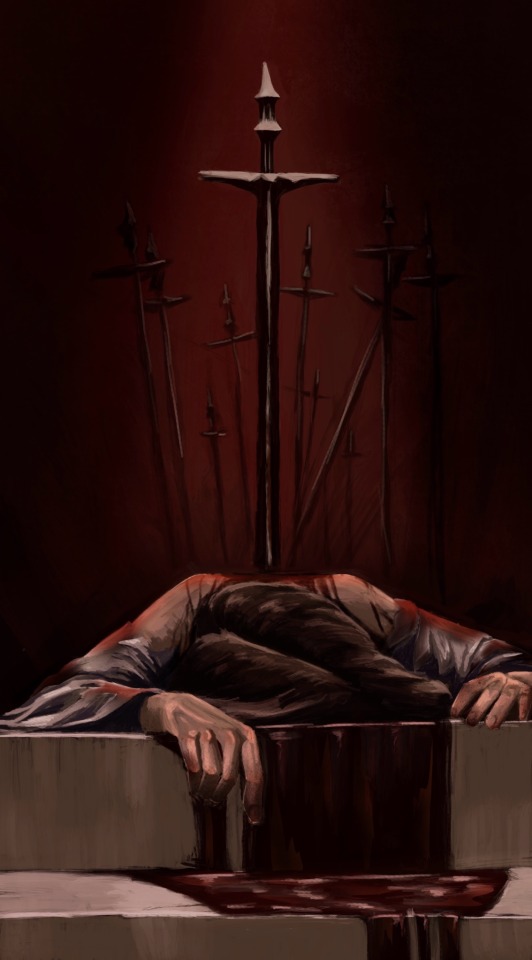Text
I need to write about how Jun Wu's belief that everyone has the capacity for evil, if you just push them hard enough, torment them long enough, is directly contradicted by the entire story of tgcf, which posits that, actually everyone has the capacity for good. The misogynistic womanizer, the depraved cannibal, the man dead set on revenge, the one filled with envious resentment, are all able to do the right thing when it comes down to it. In a way, doing good is a surrender, it's giving up, it's as easy as falling asleep. And it's so much easier than letting the evils of your past dog your heels for hundreds of years. Isn't it such a release to change? To not be stuck in your old ways?
2K notes
·
View notes
Text
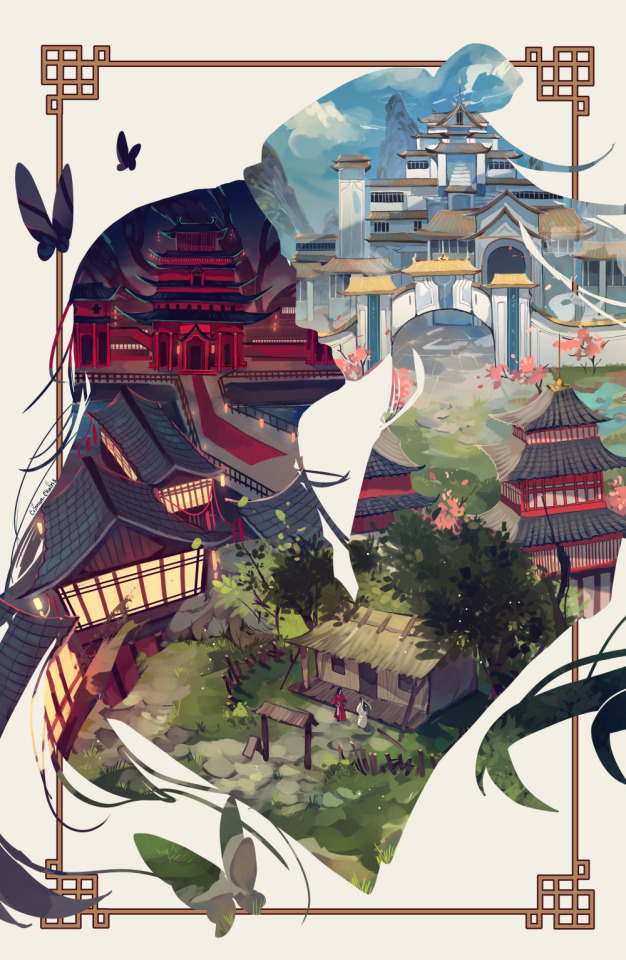
Little break for you guys XD
Been drawing some other things and I'm really happy with this one!
Wanted to include Puqi shrine in a silhouette piece ^^
Thought that it was interesting with the last pieces although Hua Cheng has Paradise Manor and Xie Lian Xianle Palace neither really consider it their home. Their home is at the humble Puqi shrine <3
6K notes
·
View notes
Note
Did JC canonically torture people he suspected of being wwx?
😭😭😭😭😭😭😭😭😭 he didn't like man that broke my fucking heart I thought there'd be like flaying thought there'd be maiming thought there'd be flogging. NOTHING!!! NOTHING!! some fucking innkeeper is like oh rumour has it he hunts down demonic cultivators. I AM INCONSOLABLE. no one even got tortured.
1K notes
·
View notes
Text
One nerd's musing about Chinese religion and "respect"
-I try to stay away from fandom discourse, but, much like how you can smell the stench from a dumpster fire without walking into said dumpster fire, I've noticed something that seemed to come up a lot in western JTTW + adjacent fandoms: "respect Chinese religion".
-Usually as a reason for why you shouldn't ship a character, because of fucking course it's shipping discourse too.
-And my first reaction is "Man, you are taking Chinese religion too darn seriously, more than people who are born and raised in China."
-My second reaction is "I mean, most of us are atheist/agnostic by default anyways, with a good number of what I'd call 'atheist/agnostics with superstitions': people who said they were not religious, yet believed in Fengshui or divinations and burnt incense at temples for good luck."
-My third reaction: "But why do I get the feeling that when you mention 'Respect', you are thinking about something completely different?"
-Then I reread an essay from Anthony C. Yu, "Religion and Literature in China: The "Obscure Way" of Journey to the West", and the metaphorical lightbulb just lit up over my head.
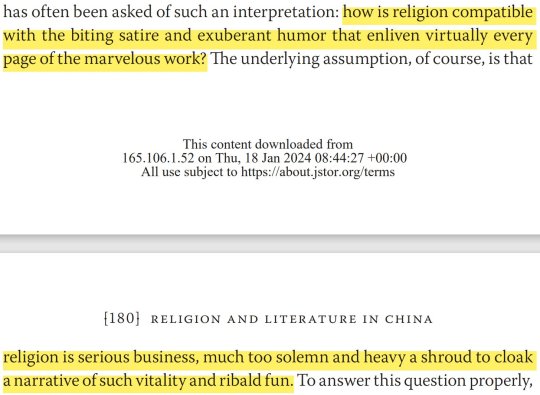

(Everything below applies more to Daoism + associated folk religions, but by the time most classic Chinese vernacular novels were written, the blending of the three religions had become well and truly mainstream.)
(The conception of gods differs from dynasty to dynasty. What I'm describing here is mostly based on Ming and Qing ones; if you went back to Han or pre-Qin times, most of these would not apply.)
(I am one of the "atheist/agnostic by default" people. I just have an interest in this kind of stuff. I am also just one Chinese person, and an actual Daoist/Buddhist/Religion Studies researcher would probably have a lot more valuable information and perspective to offer when it comes to contemporary practices and worship. Like any people on the internet: take my words with a grain of salt.)
-Even in the past, when society was far less secularized, Chinese gods are not omniscient, perfect beings whose worship is a solemn, humorless affair. Some's worship are Serious Business, but that has more to do with the sort of gods they are and the patronage they enjoy, not godhood in and of itself.
-And even the ones that you are supposed to "treat seriously" are still very human. To use an analogy I've used plenty of times before: you respect and fear them in the same way you'd respect and fear an emperor's official, or the emperor himself, because if you don't, you are not gonna like the consequences.
-However, unlike Jesus, the emperor & his officials were capable of being temperamental, flawed, or an outright asshole, divine or not. Ideally, they wouldn't be, and if you were one of the "serious" believers——people who actually got an official permit, became ordained clergy, and went to live in a temple, you were unlikely to think of your gods in that manner.
-But it wasn't a complete, utter impossibility. The lower you go in the pantheon, the closer you get to popular religion, the less "serious" the gods and their worship become. By that, I mean general attitude, not sincerity of faith. You still shouldn't be rude to them, but, well, they are more likely to take a joke in stride, or participate in the "vulgar" pleasures of commoners because they weren't as bound to Confucian moral standards or religious disciplines.
-To stretch the same analogy further: you should still respect your village head, they could still give your ass a good spanking for being a disrespectful brat, but you were not obligated to get on your knees and kowtow to them like you would do in front of a provincial magistrate, the emperor's minister, or the emperor himself, nor did they have the power to chop your head off just because you were rude.
-On the other hand, the emperor would never visit a random peasant just to help them fix their broken plow or treat them to a nice meal, but your village head could, and your relationship would probably be warmer and a lot more personal as a result.
-Your respect for them was more likely to stem from the things they actually did for you and the village as a whole, instead of something owed to this distant, powerful authority you might never get to see in your lifetime, but could change its course with a single stroke of a brush.
-Now exchange "village head" for your run-of-the-mill Tudis and Chenghuangs and friendly neighborhood spirits (because yes, people worshipped yaoguais for the exact same reasons), emperor + his officials for the Celestial Bureaucracy, and you'd have a basic idea of how Chinese religions worked on the ground level.
-This is far from absolute: maybe your village head was a spiteful old bastard who loved bullying his juniors, maybe your regional magistrate was an honest, upright man who could enjoy a good drink and a good laugh, maybe the emperor was a lenient one and wouldn't chop your head off for petty offenses. But their general degree of power over you and the closeness of your relationships still apply.
-Complicating the matter further, some folk gods (like Wutong) were worshipped not because they brought blessings, but because they were the divine equivalent of gangsters running a protection racket: you basically bribed them with offerings so they'd leave you alone and not wreck your shit. Famous people who died violently and were posthumously deified often fell into this category——shockingly enough, Guan Yu used to be one such god!
-Yeah, kinda like how your average guy could become an official through the imperial examinations, so could humans become gods through posthumous worship, or cultivate themselves into immortals and Enlightened beings.
-Some immortals aren't qualified for, or interested in a position in the Celestial Bureaucracy——they are the equivalent of your hermits, your cloistered Daoist priests, your common literati who kept trying and failing the exams. But some do get a job offer and gladly take it.
-Anyways, back to my original point: that's why it's so absurd when people pull the "Respect Chinese Religion1!!1!" card and immediately follow up with "Would you do X to Jesus?"
-Um, there are a lot of things you can do with Chinese gods that I'm pretty sure you can't do with Jesus. Like worshipping him side by side with Buddha and Confucius (Lao Tzu). Or inviting him to possess you and drink copious amount of alcohol (Tang-ki mediums in SEA). Or genderbend him into a woman over the course of several centuries because folks just like that version of Jesus better (Guan Yin/Avalokitesvara).
-But most importantly, Chinese religions are kinda a "free market" where you could pick and choose between gods, based on their vicinity to you and how efficient they were at answering prayers. You respect them because they'll help you out, you aren't an asshole and know your manners, and pissing them off is a bad idea in general, not because they are some omnipotent, perfect beings who demand exclusive and total reverence.
-A lot of the worship was also, well, very "practical" and almost transactional in nature: leave offerings to Great Immortal Hu, and he doesn't steal your imperial seal while you aren't looking. Perform the rites right and meditate on a Thunder General's visage, and you can temporarily channel said deity's power. Get this talisman for your kids at Bixia Yuanjun's temple, and they'll be protected from smallpox.
-"Faith alone" or "Scripture alone" is seldom the reason people worship popular deities. Even the obsession with afterlife wasn't about the eternal destination of your soul, and more about reducing the potential duration of the prison sentence for you and your loved ones so you can move on faster and reincarnate into a better life.
-Also, there isn't a single "canon" of scriptures. Many popular gods don't show up in Daoist literature until much later. Daoist scriptures often came up with their own gigantic pantheons, full of gods no one had heard of prior to said book, or enjoyed no worship in temples whatsoever.
-In the same way famous dead people could become gods via worship, famous fictional characters could, too, become gods of folk religion——FSYY's pantheon was very influential on popular worship, but that doesn't mean you should take the novels as actual scriptures.
-Like, God-Demon novels are to orthodox Daoism/Buddhism what the Divine Comedy is to medieval Christian doctrines, except no priests had actually built a Church of Saint Beatrice, while Daoists did put FSYY characters into their temples. By their very nature, the worship that stemmed from these books is not on the same level of "seriousness" as, say, the Tiantai school of Buddhism and their veneration of the Lotus Sutra.
-At the risk of being guilty of the same insertion of Abrahamic religion where it doesn't belong: You don't cite Dante's Inferno in a theological debate, nor would any self-respecting pastor preach it to churchgoers on a Sunday.
-Similarly, you don't use JTTW or FSYY as your sole evidence for why something is "disrespectful to Chinese religion/tradition" when many practitioners of said religions won't treat them as anything more than fantasy novels.
-In fact, let's use Tripitaka as an example. The historical Xuanzang was an extraordinarily talented, faithful, and determined monk. In JTTW, he was a caricature of a Confucian scholar in a Buddhist kasaya and served the same narrative function as Princess Peach in a Mario game.
-Does the presence of satire alone make JTTW anti-Buddhist, or its religious allegories less poignant? I'd say no. Should you take it as seriously as actual Buddhist sutras, when the book didn't even take itself 100% seriously? Also no.
-To expand further on the idea of "seriousness": even outside of vernacular novels, practitioners are not beholden to a universal set of strict religious laws and taboos.
-Both Daoism and Buddhism had what we called "cloistered" and "non-cloistered" adherents; only the former needed to follow their religious laws and (usually) took a vow of celibacy.
-Certain paths of Daoist cultivation allow for alcohol and sexual activities (thanks @ruibaozha for the info), and some immortals, like Lv Dongbin, had a well-established "playboy" reputation in folklore.
-Though it was rarer for Buddhism and very misunderstood, esoteric variants of it did utilize sexual imageries and sex. And, again, most of the above would not apply if you weren't among the cloistered and ordained clergy.
-Furthermore, not even the worship of gods is mandatory! You could just be a Daoist who was really into internal alchemy, cultivating your body and mind in order to prolong your lifespan and, ideally, attain immortality.
-This idea of "respect" as…for a lack of better words, No Fun & R18 Stuff Allowed, you must treat all divinity with fearful reverence and put yourself completely at their mercy, is NOT the norm in Chinese religious traditions.
-There are different degrees and types of respect, and not every god is supposed to be treated like the Supreme Heavenly Emperor himself during an imperial ceremony; the gods are capable of cracking a joke, and so are we!
TL;DR: Religions are complicated, and you aren't respecting Chinese religions by acting like a stereotypical Puritan over popular Chinese deities and their fictional portrayals.
1K notes
·
View notes
Photo

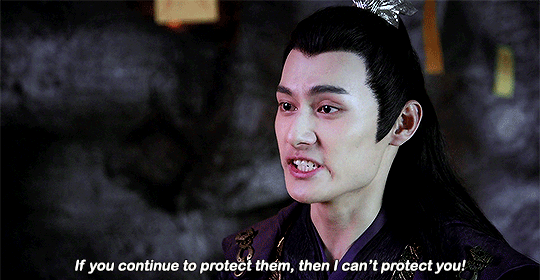


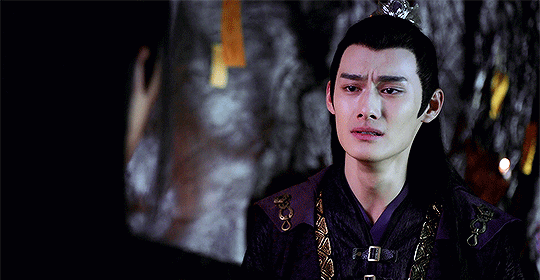
Jiang Cheng & Wei Wuxian | Episode 28
4K notes
·
View notes
Note
hi where do I start learning about sun wukong
sun wukong is the most popular protagonist of the ming dynasty novel journey to the west, which is a very good book (i’m a big fan of the 2012 revised translation by anthony c. yu), but it is a normal amount of very long for one of the chinese classics, so until then you can check out some of the many film adaptations, most of which are mostly or entirely about sun wukong. some of my personal favorites are princess iron fan (1941), havoc in heaven (1961), a chinese odyssey (1995), journey to the west: conquering the demons (2013), the monkey king 2 (2016), and nezha reborn (2021), although most of these assume the audience is already familiar with the character and story, so you’ll get more if you read the wikipedia pages i linked first. the book the epic crush of genie lo was embarrassingly formative to my early teenage years and also is based on the monkey king story, and i also believe there’s a lego tv show, lego monkie kid, but i haven’t watched it so i can’t speak to its quality. i hope you enjoy what you check out!
20 notes
·
View notes
Text
We need to make absolute certain that Sun Wukong becomes a huge fucking deal in America , within the next millennium
2K notes
·
View notes
Note
i was wondering if you have any thoughts about why hua cheng decided to challenge the 33 gods + feng xin and mu qing instead of just killing them. i was thinking about how hua cheng's MO for violence seems to hinge a lot on the victims choosing their fate (e.g., running the gambler's den where gamblers set their own stakes, and the duals with the gods) and i was trying to figure out why he might operate this way instead of just killing the gods outright. like, i can understand mq and fx potentially being exceptions because their relationship with xie lian (and thus their betrayal) is more personal, but why not just kill the 33 gods? why toy with them? i guess choosing your own fate/doom is a big theme in the novel as a whole, but is there another reason why it is such an integral part of hua cheng's revenge?
sorry to bother, and no pressure to respond! this question has just been rolling around in my head today and you always have great analyses so i figured i should send it your way
ooh interesting ask, thank you for sending! not a bother at all.
Metatextually I think you're right about part of it being about people choosing their own fate - and that being something that Hua Cheng does seem to believe in particularly when it comes to people damning themselves. But I also think in-text it has to do with that the defeat of the 33 gods instead of killing them is very much not just about wanting the gods in question dead or destroyed but about wanting them humiliated, the same way that they humiliated Xie Lian.
He sets things up not just so that they will choose their way into losing, but specifically to maximize the impact of their downfall, to destroy them not just as individuals but to destroy their identity as a god itself. He doesn't just want them dead, he wants them demolished, the godhood that made them think themselves superior to Xie Lian taken away. If he kills them, then they're gods murdered in their power by a Ghost King, which still grants them a certain amount of dignity. But if they're gods defeated by a Ghost King on their own turf, then they lose face and therefore lose believers and therefore fade into obscurity before they die.
The same obscurity, incidentally, that Xie Lian was supposed to fade into, and only didn't because of the strength of Hua Cheng's belief/worship.
or at least that's my thoughts on it.
67 notes
·
View notes
Note
fenglian?
post a meme and then disappear for a weekend, that's me!! but here I am finally answering these
the trouble with memes that are dichotomies is inevitably I run into situations like this where the answer is "depends, on what you mean by 'ship it', mostly" but I guess the answer here is mostly don't ship it slightly more than do
Why don’t you ship it? again, it's not that I don't exactly (at the very least the intense devotion that never goes away, paired with a certain amount of idolization that also never goes away, despite everything, is real) and more just that the particular dynamic that does exist isn't one that draws me as intensely as other dynamics surrounding it (mu qing and xie lian, mu qing and feng xin, the three of them as a trio taken together). so it's less "I'm not into this as a relationship" and more just "I have other priorities in the surrounding environs and therefore it falls by the wayside by comparison."
What would have made you like it? again, it's not that I don't so much as it's not as compelling to me as adjacent dynamics; I think I'd probably like it more if I got more about feng xin's messy feelings about xie lian on page. I know they're there, and you can feel them to a certain extent, but they're not quite as visible as I need them to be.
Despite not shipping it, do you have anything positive to say about it? feng xin has a lot of the centuries spanning devotion and idolization to xie lian that hua cheng does, he just feels more complicated about it, and that's hot.
16 notes
·
View notes
Text

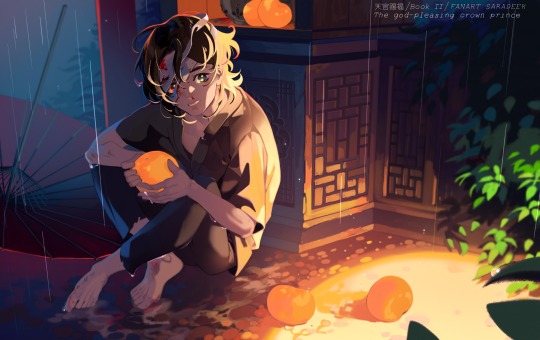
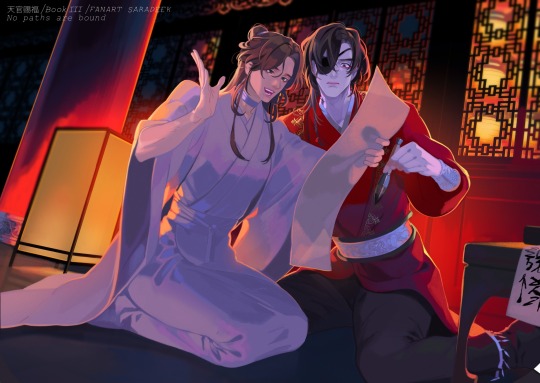
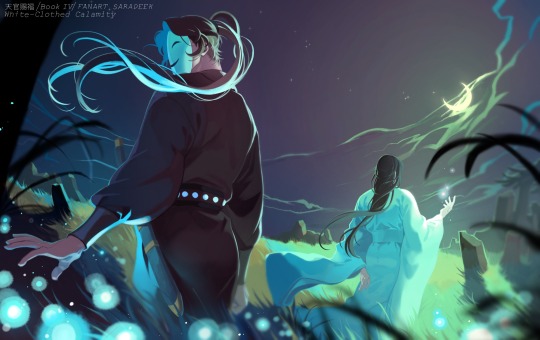

One illust for each tgcf book
6K notes
·
View notes
Note
OH ACTUALLY also junlian 👀

sicko.jpg but this meme didn't necessarily fully encapsulate what I feel about them....still bingo though. the Devotion is mostly one-sided here but it sure is devotion. hua cheng eat your heart out, you aren't the only one spending eight hundred years incurably obsessed with xie lian
also where is the fucking content, and why is what I have found not nearly weird enough (for me, personally)
33 notes
·
View notes
Text
controversial perhaps but i just cannot believe that hua cheng is the top in his and xie lian's relationship. or at least not exclusively. annnnd send post
103 notes
·
View notes
Text
jun wu's ending will never not drive me absolutely insane. it's just...nobody's asked to forgive him or forget what he's done, but he's not being punished, either, and xie lian's deeply symbolic gesture of passing on the bamboo hat (representing the compassion he received at his lowest point) is so heavy with meaning.
jun wu is finished but he doesn't have to die and he doesn't have to suffer, or at least the narrative isn't lingering on his suffering - to the contrary! it portrays his defeat as a relief even to him. he doesn't even have to be imprisoned in eternal isolation - mei nianqing is there to stay with him explicitly as a friend.
it's such a compassionate ending for a main antagonist and it murders me.
(anyway once again mxtx's rejection of the punitive impulse and truly jun wu is the apotheosis of that and feels a little like mxtx banging the reader over the head with it as a theme. or maybe that's just me.)
347 notes
·
View notes
Text
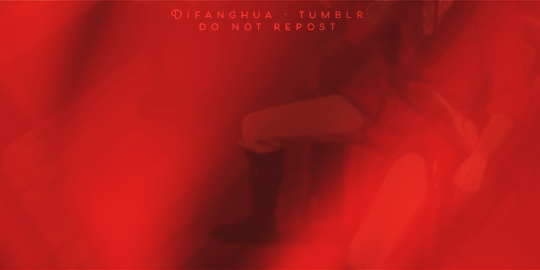
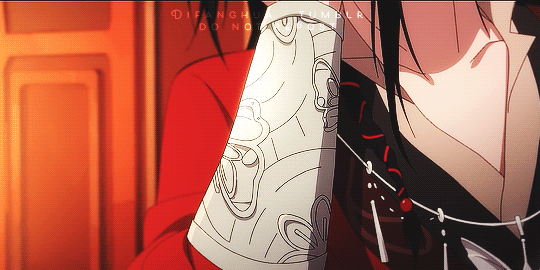
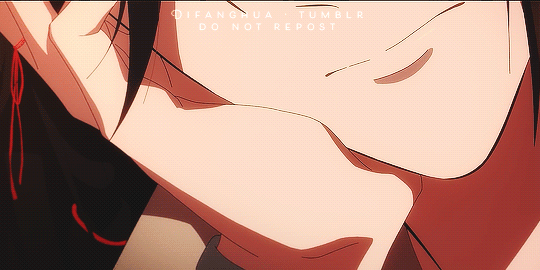
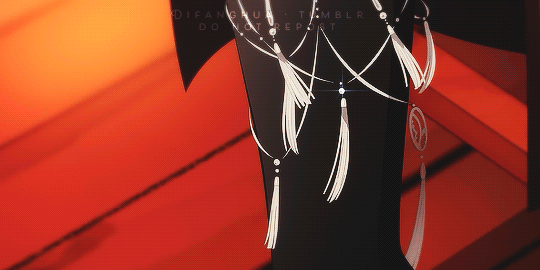
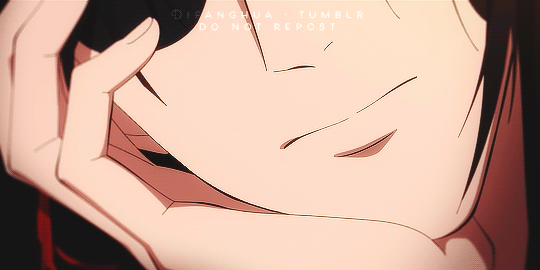
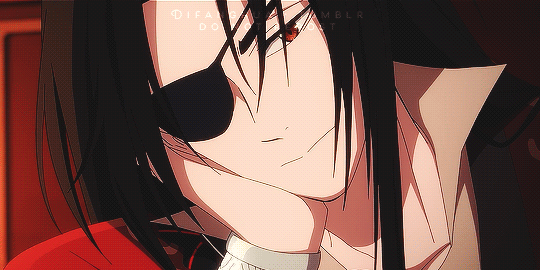
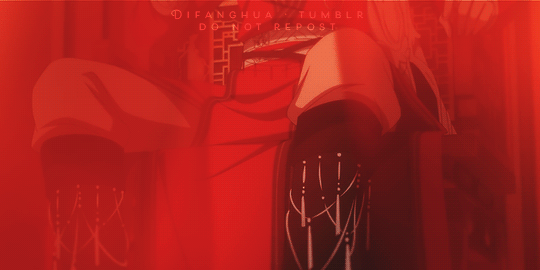

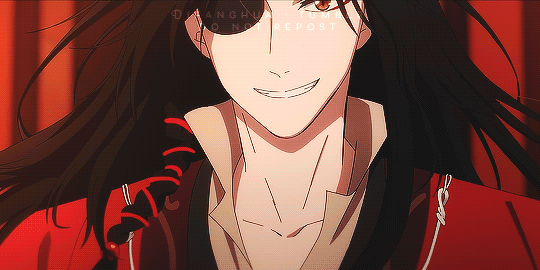
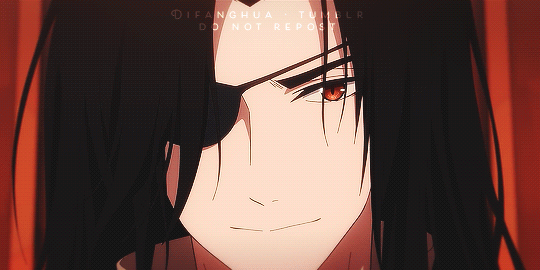
Don’t even talk about an arm; not even that miserable life of yours is worth a cent here.
HEAVEN OFFICIAL’S BLESSING 天官赐福 🦋 season 2 episode 1
618 notes
·
View notes


